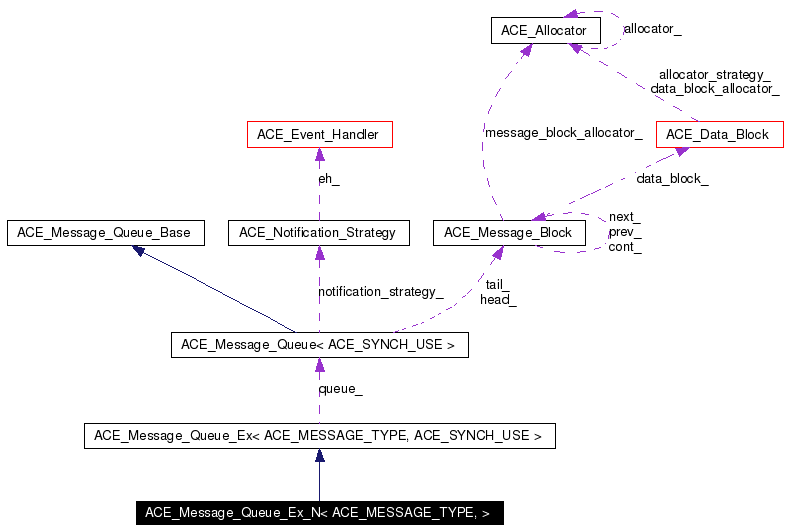
#include <Message_Queue_T.h>
Inheritance diagram for ACE_Message_Queue_Ex_N< ACE_MESSAGE_TYPE, >:


Public Member Functions | |
| ACE_Message_Queue_Ex_N (size_t high_water_mark=ACE_Message_Queue_Base::DEFAULT_HWM, size_t low_water_mark=ACE_Message_Queue_Base::DEFAULT_LWM, ACE_Notification_Strategy *ns=0) | |
| virtual | ~ACE_Message_Queue_Ex_N (void) |
| Close down the message queue and release all resources. | |
| virtual int | enqueue_head (ACE_MESSAGE_TYPE *new_item, ACE_Time_Value *tv=0) |
| virtual int | enqueue_tail (ACE_MESSAGE_TYPE *new_item, ACE_Time_Value *tv=0) |
Public Attributes | |
| ACE_ALLOC_HOOK_DECLARE | |
| Declare the dynamic allocation hooks. | |
Protected Member Functions | |
| ACE_Message_Block * | wrap_with_mbs_i (ACE_MESSAGE_TYPE *new_item) |
As ACE_Message_Queue_Ex, ACE_Message_Queue_Ex_N is a strongly-typed version of the ACE_Message_Queue. If ACE_SYNCH_DECL is ACE_MT_SYNCH then all operations are thread-safe. Otherwise, if it's ACE_NULL_SYNCH then there's no locking overhead.
The ACE_MESSAGE_TYPE messages that are sent to this queue can be chained. Messages are expected to have a next method that returns the next message in the chain; ACE_Message_Queue_Ex_N uses this method to run through all the incoming messages and enqueue them in one call.
Definition at line 1382 of file Message_Queue_T.h.
|
||||||||||||||||||||
|
Initialize an ACE_Message_Queue_Ex_N. The high_water_mark determines how many bytes can be stored in a queue before it's considered "full." Supplier threads must block until the queue is no longer full. The low_water_mark determines how many bytes must be in the queue before supplier threads are allowed to enqueue additional messages. By default, the high_water_mark equals the low_water_mark, which means that suppliers will be able to enqueue new messages as soon as a consumer removes any message from the queue. Making the low_water_mark smaller than the high_water_mark forces consumers to drain more messages from the queue before suppliers can enqueue new messages, which can minimize the "silly window syndrome." Definition at line 338 of file Message_Queue_T.cpp. References ACE_TRACE.
00340 : 00341 ACE_Message_Queue_Ex<ACE_MESSAGE_TYPE, ACE_SYNCH_USE> (high_water_mark, 00342 low_water_mark, 00343 ns) 00344 { 00345 ACE_TRACE ("ACE_Message_Queue_Ex_N<ACE_MESSAGE_TYPE, ACE_SYNCH_USE>::ACE_Message_Queue_Ex_N"); 00346 } |
|
||||||||||
|
Close down the message queue and release all resources.
Definition at line 349 of file Message_Queue_T.cpp. References ACE_TRACE.
00350 {
00351 ACE_TRACE ("ACE_Message_Queue_Ex_N<ACE_MESSAGE_TYPE, ACE_SYNCH_USE>::~ACE_Message_Queue_Ex_N");
00352 }
|
|
||||||||||||||||
|
Enqueue one or more
Reimplemented from ACE_Message_Queue_Ex< ACE_MESSAGE_TYPE, ACE_SYNCH_USE >. Definition at line 356 of file Message_Queue_T.cpp. References ACE_TRACE, and ACE_Message_Block::release().
00358 {
00359 ACE_TRACE ("ACE_Message_Queue_Ex_N<ACE_MESSAGE_TYPE, ACE_SYNCH_USE>::enqueue_head");
00360
00361 // Create a chained ACE_Message_Blocks wrappers around the 'chained'
00362 // ACE_MESSAGE_TYPES.
00363 ACE_Message_Block *mb = this->wrap_with_mbs_i (new_item);
00364 if (0 == mb)
00365 {
00366 return -1;
00367 }
00368
00369 int result = this->queue_.enqueue_head (mb, timeout);
00370 if (-1 == result)
00371 {
00372 // Zap the messages.
00373 mb->release ();
00374 }
00375 return result;
00376 }
|
|
||||||||||||||||
|
Enqueue one or more
Reimplemented from ACE_Message_Queue_Ex< ACE_MESSAGE_TYPE, ACE_SYNCH_USE >. Definition at line 380 of file Message_Queue_T.cpp. References ACE_TRACE, and ACE_Message_Block::release().
00382 {
00383 ACE_TRACE ("ACE_Message_Queue_Ex_N<ACE_MESSAGE_TYPE, ACE_SYNCH_USE>::enqueue_tail");
00384
00385 // Create a chained ACE_Message_Blocks wrappers around the 'chained'
00386 // ACE_MESSAGE_TYPES.
00387 ACE_Message_Block *mb = this->wrap_with_mbs_i (new_item);
00388 if (0 == mb)
00389 {
00390 return -1;
00391 }
00392
00393 int result = this->queue_.enqueue_tail (mb, timeout);
00394 if (-1 == result)
00395 {
00396 // Zap the message.
00397 mb->release ();
00398 }
00399 return result;
00400 }
|
|
||||||||||
|
An helper method that wraps the incoming chain messages with ACE_Message_Blocks. Definition at line 404 of file Message_Queue_T.cpp. References ACE_NEW_NORETURN, ACE_NEW_RETURN, ACE_TRACE, ACE_Message_Block::next(), and ACE_Message_Block::release().
00405 {
00406 ACE_TRACE ("ACE_Message_Queue_Ex_N<ACE_MESSAGE_TYPE, ACE_SYNCH_USE>::wrap_with_mbs_i");
00407
00408 // We need to keep a reference to the head of the chain
00409 ACE_Message_Block *mb_head = 0;
00410
00411 ACE_NEW_RETURN (mb_head,
00412 ACE_Message_Block ((char *) new_item,
00413 sizeof (*new_item),
00414 ACE_Message_Queue_Ex<ACE_MESSAGE_TYPE, ACE_SYNCH_USE>::DEFAULT_PRIORITY),
00415 0);
00416
00417 // mb_tail will point to the last ACE_Message_Block
00418 ACE_Message_Block *mb_tail = mb_head;
00419
00420 // Run through rest of the messages and wrap them
00421 for (ACE_MESSAGE_TYPE *pobj = new_item->next (); pobj; pobj = pobj->next ())
00422 {
00423 ACE_Message_Block *mb_temp = 0;
00424 ACE_NEW_NORETURN (mb_temp,
00425 ACE_Message_Block ((char *) pobj,
00426 sizeof (*pobj),
00427 ACE_Message_Queue_Ex<ACE_MESSAGE_TYPE, ACE_SYNCH_USE>::DEFAULT_PRIORITY));
00428 if (mb_temp == 0)
00429 {
00430 mb_head->release ();
00431 mb_head = 0;
00432 break;
00433 }
00434
00435 mb_tail->next (mb_temp);
00436 mb_tail = mb_temp;
00437 }
00438
00439 return mb_head;
00440 }
|
|
|||||
|
Declare the dynamic allocation hooks.
Reimplemented from ACE_Message_Queue_Ex< ACE_MESSAGE_TYPE, ACE_SYNCH_USE >. Definition at line 1453 of file Message_Queue_T.h. |
 1.3.6
1.3.6